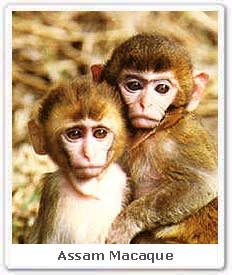| Kingdom : | Animalia |
| Phylum : | Chordata |
| Class: | Mammalia |
| Order : | Carnivora |
| Family : | Primates |
| Genus : | Cercopithecidae |
| Species : | Macca |
| Zoological name : | Macaca assamensis |
| Found In | Kaziranga and Sundarbans National Park in India |
 Physical appearance : They have yellowish to dark brown
coat. They do not have hairs on their face. Skin of the adults is red in
colour. It has short tail. Male length of the head and body is 431-587mm and
weigh around 4.9-8.6kg. Female length of the head and body 538-730mm and
weigh around 7.9-15.0kg.This species has cheek pouches to carry food in
while it forages. It is heaviest of all macaques found in India.
Physical appearance : They have yellowish to dark brown
coat. They do not have hairs on their face. Skin of the adults is red in
colour. It has short tail. Male length of the head and body is 431-587mm and
weigh around 4.9-8.6kg. Female length of the head and body 538-730mm and
weigh around 7.9-15.0kg.This species has cheek pouches to carry food in
while it forages. It is heaviest of all macaques found in India. Presence in India : Assam Macaque is found in the north eastern part of India in Assam. It is also found in the entire Himalayan range eastward from Uttaranchal, in Kaziranga and Sundarbans National Park.
Species : Eastern Assamese Macaque (Macaca assamensis assamensis), Western Assamese Macaque (Macaca assamensis pelops)
Habitat : Assam Macaque prefer mountain, evergreen, bamboo, and deciduous dry forests at 300 – 3500 m ergreen, bambo
Diet : The Assam Macaque consumes fruits, leaves, invertebrates, cereals, insect and mammal prey.
Reproduction :The gestation period lasts for 165 days. Assemese Macaque give birth to single offspring which weighs around 400 g at birth.
Conservation status : Assam Macaque are classified as vulnerable by the 2000 IUCN Red list. Habitat destruction has declined the population of the Assam Macaque in the north eastern region of India. They are also haunted by the local tribesmen for food. It have been hunted in the Himalayan regions of North Bengal, Sikkim, and Arunachal Pradesh where it invades crop fields frequently. The Assamese macaque is listed under Schedule II of the Wildlife (Protection) Act, 1972.
Lifespan : The lifespan of the Assam Macaque is unknown.






